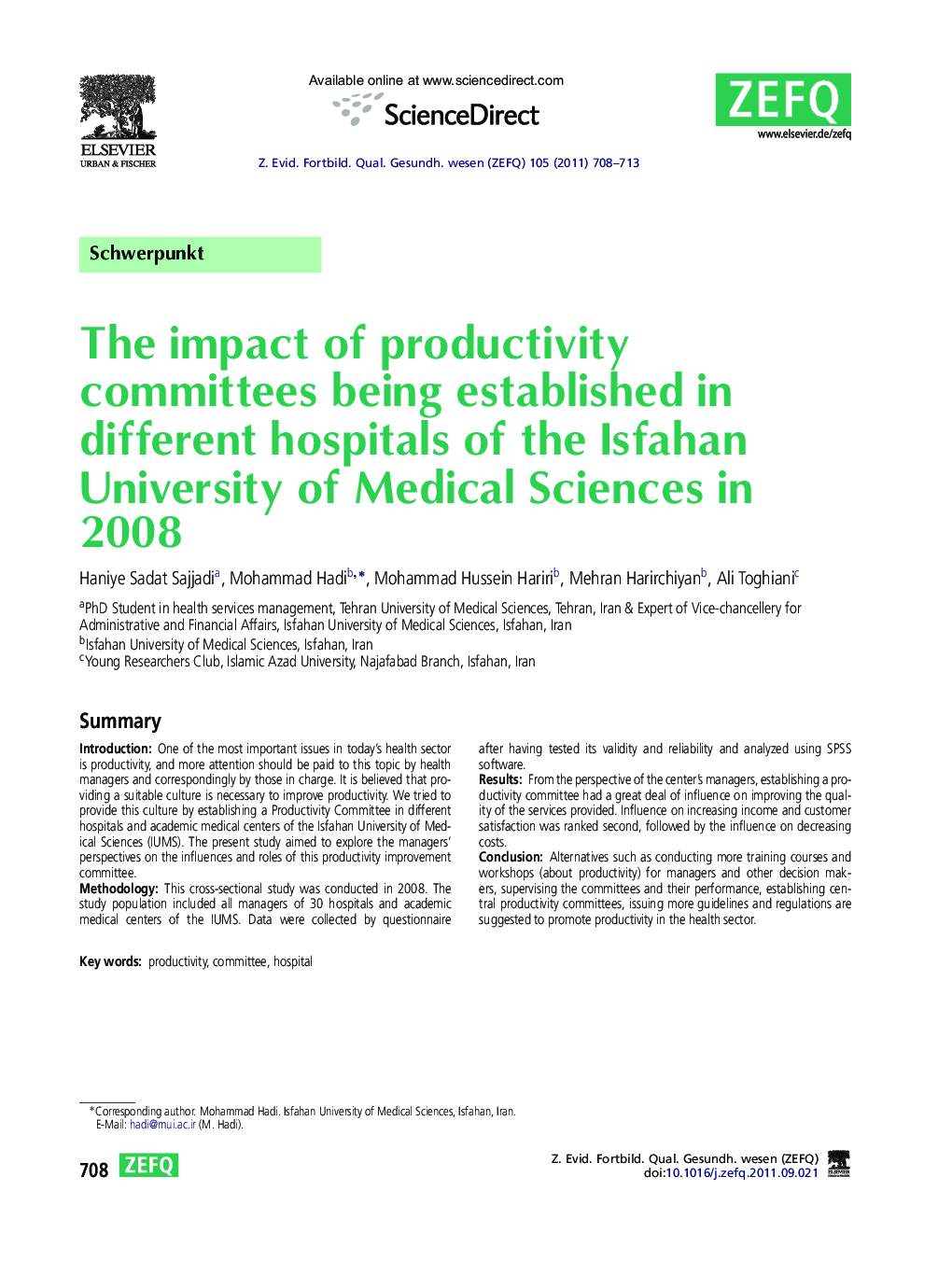| Article ID | Journal | Published Year | Pages | File Type |
|---|---|---|---|---|
| 1095351 | Zeitschrift für Evidenz, Fortbildung und Qualität im Gesundheitswesen | 2011 | 6 Pages |
SummaryIntroductionOne of the most important issues in today's health sector is productivity, and more attention should be paid to this topic by health managers and correspondingly by those in charge. It is believed that providing a suitable culture is necessary to improve productivity. We tried to provide this culture by establishing a Productivity Committee in different hospitals and academic medical centers of the Isfahan University of Medical Sciences (IUMS). The present study aimed to explore the managers’ perspectives on the influences and roles of this productivity improvement committee.MethodologyThis cross-sectional study was conducted in 2008. The study population included all managers of 30 hospitals and academic medical centers of the IUMS. Data were collected by questionnaire after having tested its validity and reliability and analyzed using SPSS software.ResultsFrom the perspective of the center's managers, establishing a productivity committee had a great deal of influence on improving the quality of the services provided. Influence on increasing income and customer satisfaction was ranked second, followed by the influence on decreasing costs.ConclusionAlternatives such as conducting more training courses and workshops (about productivity) for managers and other decision makers, supervising the committees and their performance, establishing central productivity committees, issuing more guidelines and regulations are suggested to promote productivity in the health sector.
ZusammenfassungHintergrundProduktivität zählt zu den wichtigsten Faktoren des modernen Gesundheitswesens. Deshalb sollten Gesundheitsmanager und die jeweiligen Entscheidungsträger diesem Thema mehr Aufmerksamkeit widmen. Um die Produktivität zu steigern, muss unserer Meinung nach eine entsprechende Kultur geschaffen werden. Dies haben wir mit der Einrichtung von Produktivitätskomitees in verschiedenen Kliniken und Lehrkrankenhäusern der Medizinischen Hochschule der Universität von Isfahan (Isfahan University of Medical Sciences, IUMS) zu erreichen versucht. Ziel der vorliegenden Untersuchung war es, die Meinungen der Führungskräfte zum Einfluss und zur Rolle dieser Komitees zur Steigerung der Produktivität zu erfassen.MethodeDiese Querschnittstudie wurde 2008 durchgeführt. Die Studienpopulation umfasste alle Führungskräfte der 30 zur IUMS gehörenden Kliniken und akademischen Lehrkrankenhäuser. Die Daten wurden anhand eines auf seine Validität und Reliabilität geprüften Fragebogens erhoben und mithilfe der SPSS-Software analysiert.ErgebnisseNach Auffassung der Krankenhausmanager hatte die Einführung des Produktivitätskomitees einen sehr großen Einfluss auf die Verbesserung der Qualität der angebotenen Leistungen; an zweiter Stelle wurde der Einfluss auf die Steigerung der Einkünfte und eine verbesserte Kundenzufriedenheit und an dritter Stelle der Einfluss auf die Senkung der Kosten genannt.SchlussfolgerungenEs werden Alternativen wie die verstärkte Durchführung von Schulungskursen und Workshops (zum Thema Produktivität) für Manager und andere Entscheidungsträger, die Supervision der Komitees und ihrer Leistungen, die Einrichtung eines zentralen Produktivitätskomitees sowie die Erstellung weiterer Leitlinien und Regularien vorgeschlagen, um die Produktivität im Gesundheitswesen zu steigern.
